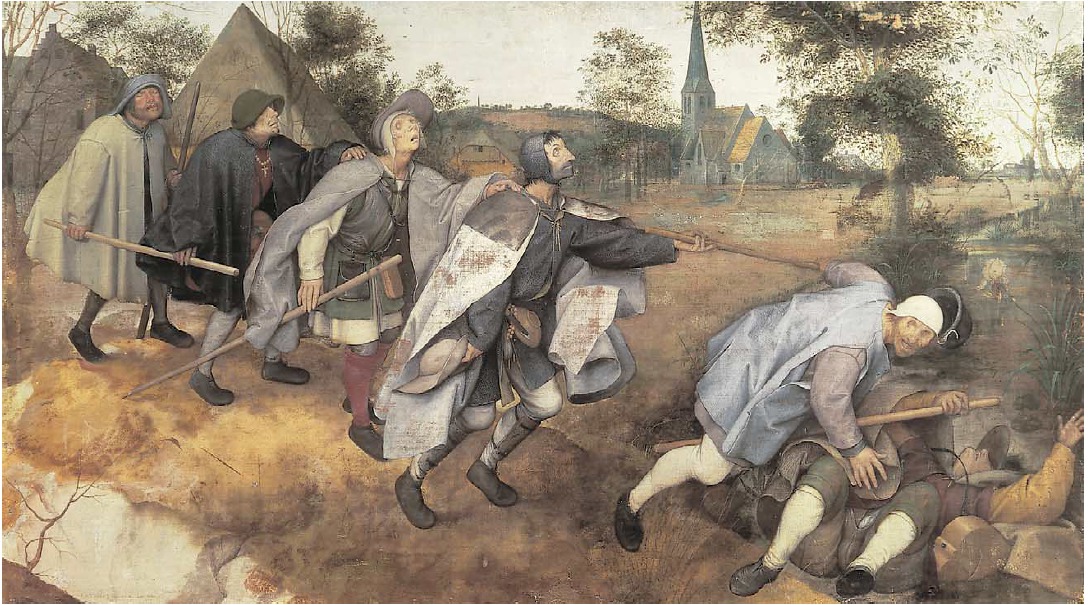Mankind resembles Pieter Brueghel the Elder’s painting of the blind leading the blind. As the great Pascal tells us (great not because of his often misunderstood Wager but for the extent of his vision):
Truth is so obscure in these times, and falsehood so established, that, unless we love the truth, we cannot know it.
Without having a clear picture of the relationship of theology to philosophy, and, more broadly, that of the order of grace to the order of nature, mankind is led between the twin evils of rationalism and fideism.
On one side we have the order of nature. God made our first parents good with his incomparably magnificent design and so, rather than accept a pantheistic absorption into the divine as is common in Eastern religions, we should appreciate our highest characteristics: reason and will. It follows that there is a body of truths proper to philosophy whose evidence does not depend on faith but on philosophy’s own principles. Philosophy itself is focused specifically on being qua being: reality. However, God enters indirectly into philosophy when one considers the first cause of all things. Although we can know something about God from philosophy, we can only know how he is in relation to creatures as their creator and preserver, rather than know God as he is in himself.
On the other side we have the order of grace. The order of grace has been gratuitously given from the Redeemer. This order is, properly speaking, a kind of divine illumination which allows the mind to know truths which are not self-evident according to reason. We can indeed know these truths directly through divine grace. Consequently, I do not think that we can know of God only through creatures or that to love others is the highest commandment. On the contrary, revelation shows us new things and Tradition has always taught that to love God is the first commandment while to love creatures is the second one, although these two commandments should not be seen in opposition to one another.
Once we understand the distinction between the order of nature and the order of grace, we can finally tackle the question: how does philosophy relate to theology, how does Athens relate to Jerusalem? A solution to this problem must keep in mind that even though the order of grace is superior to the order of nature, the order of nature is not thereby abolished. It cannot be abolished because if we said so we would lose, on the one hand, our own humanity and, on the other, blaspheme against the goodness of God’s own creation. As Aquinas always said, grace perfects nature. God does not destroy creatures; he perfects them by making them participate in his supernatural scheme. How does this bear on the relationship between faith and reason? I answer: philosophia ancilla theologiae est. In other words, philosophy achieves its true perfection not when it is autonomous and free, but when it serves theology. This can be understood in two senses, the second more important than the first. Firstly, philosophy reaches the heights of clarity and profundity when it allows theology to guide it away from errors, ambiguities, and confusions into the beauty of truth. Secondly, and most importantly, philosophy ministers to theology by allowing the latter to express its mysteries in terms accessible to the reason of our finite minds. From as early as the Council of Nicaea’s use of the term “homoousios” to the discussion of the “form and matter” of the Eucharist, the Church has used philosophy to help us better understand the mysteries of faith while we still live as wayfarers. Taking Gilson and his The Spirit of Medieval Philosophy as our guide, we can see how the principle fides quaerens intellectum suggests that faith speaks to reason by providing it with a previously inaccessible panorama of truth.
In conclusion, as St. Bonaventure argues in his De Reductione Artium ad Theologiam and as is indeed universal to the entire Christian tradition ubique, semper, ab omnibus, the order of nature achieves its full perfection only when it ministers to the order of grace, reason only when it ministers to grace, philosophy only when it ministers to theology.
Pascal said the same thing:
If we submit everything to reason our religion will be left with nothing mysterious or supernatural. If we offend the principles of reason our religion will be absurd and ridiculous… These are two equally dangerous extremes: to exclude reason, to admit nothing but reason.


Leave a Reply